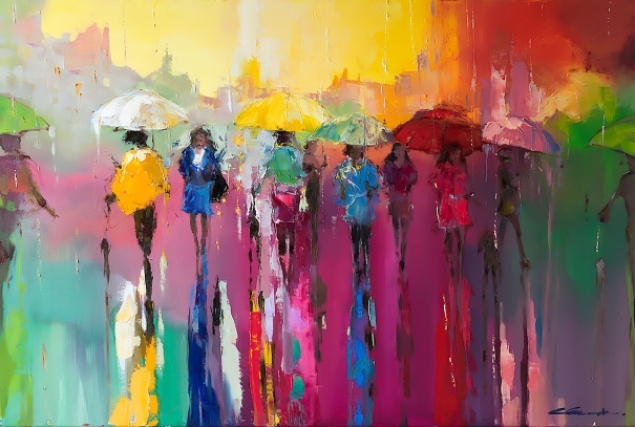The original Fauvist artists were a small group of French painters who applied colour to their canvases straight from the tube. No mixing. No shading. Just pigments in their raw form, applied in thick brushstrokes and bold lines. Patterns of colour prevailed over realistic representation, for which the artists were harshly criticised and called 'fauves', or 'wild beasts'. Henri Matisse was a key leader of the Fauvism movement, which spanned the first decade of the 20th Century.
We've spotlighted five contemporary artists whose work is as colour-intense as that of the Fauves.
1. Max naylor
Max creates colourful, dreamy inkscapes inspired by places that have been observed, memory and imagination. His work is playful and abstract and his bright hues and heavy brushstrokes certainly echo the colour-loving Fauves.

2. Tim Fowler
Tim uses acrylics, oils, gloss, varnish and spray paint to create colourful images that have abstract elements. His portraits and architecture-inpired works have the bold colours of Fauvism, plus the simplification of form that the Fauvist artists favoured.
3. Barbara Rae
Barbara is one of Scotland's foremost contemporary artists. Her abstract landscapes are bursting with sun-drenched colours. Much like the Fauves, she applies a lot of her pigments in their pure form - layering one colour over another to achieve the effect of perspective.
4. EWA CZARNIECKA
Ewa's paintings are all about colour - and reflections of colour. Her paint is thick, and her colours bold. No doubt the Fauves would have loved the rainbow palette that characterises Ewa's portraits, still lifes and landscapes.
Walking with Rainbow by Ewa Czarniecka
5. POL LEDENT
Colour is integral to Pol's abstracts. Complementary colours sit side by side, hot and cold, giving his canvases form, depth and a sense of movement. As in the works of the 20th century Fauvism colour takes precedence over form in Pol's canvases.
Abstract 8871501 by Pol Ledent





 Andy Warhol
Andy Warhol Sandra Blow
Sandra Blow Tabitha Soren
Tabitha Soren Patrick Hughes
Patrick Hughes Day Bowman
Day Bowman Nelson Makamo
Nelson Makamo Takashi Murakami
Takashi Murakami Daisy Cook
Daisy Cook Fred Ingrams
Fred Ingrams Barbara Rae
Barbara Rae Bruce Mclean
Bruce Mclean Tracey Emin
Tracey Emin




